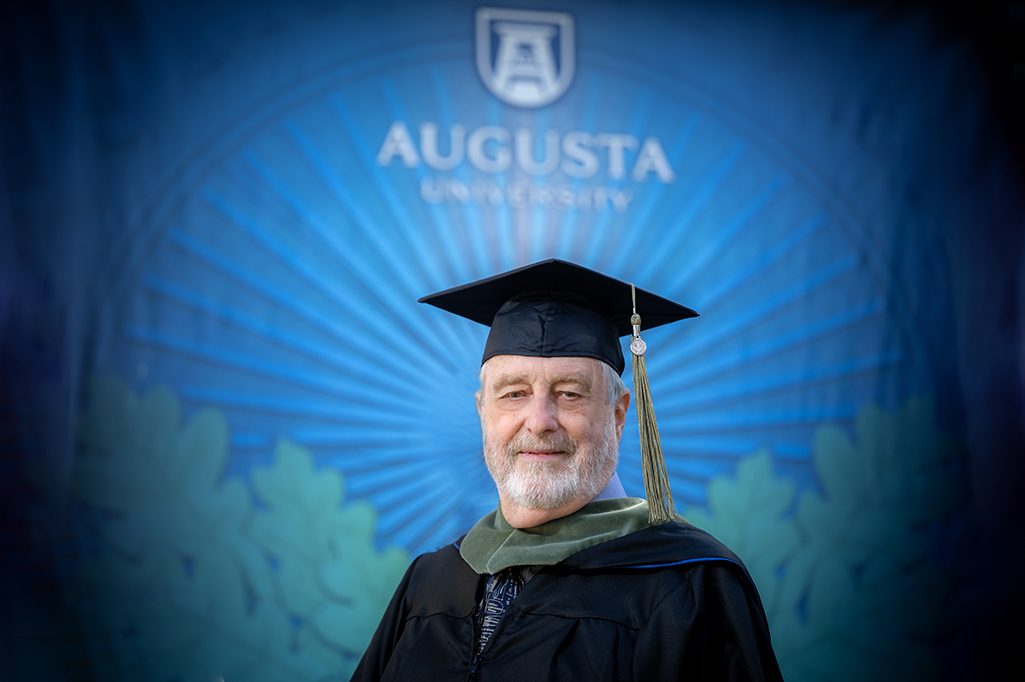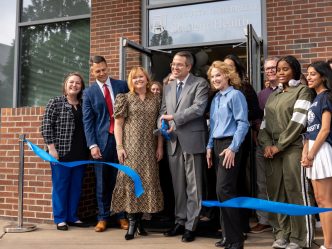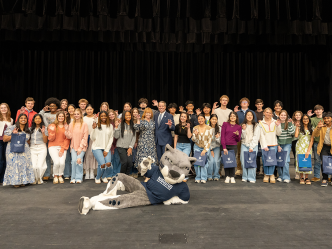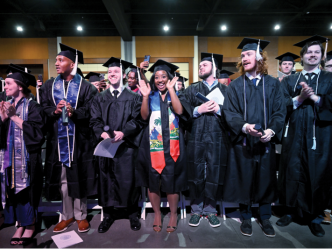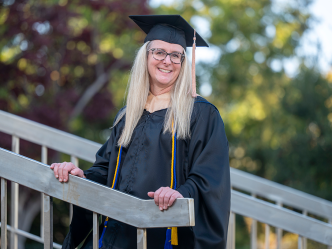From a very early age, Bill Nolan, PhD, knew he wanted to be a psychologist. What young Bill would never have guessed was that he would be walking across the stage during the Graduate Ceremony this week to receive his fifth college degree, a Master of Science in Kinesiology from the College of Education and Human Development at Augusta University with a certificate in sports coaching, at the age of 75.
And he has no plans to slow down.
The path to this point has been anything but straight. Born in Duluth, Minnesota, Nolan, the eldest of eight children, graduated from high school in Omaha, Nebraska, and became the first and only person in his family to go to college.
“I remember my high school graduation. I went to Creighton Prep, and I remember people making a big deal out of it. And my thought was, ‘Wait a minute — I’ve got three more graduations to go before I can begin my life.’” he said.
He graduated from Creighton University in Omaha with his Bachelor of Arts in Psychology in 1970 and followed that up with his Master of Arts in Clinical Psychology from the University of Cincinnati in 1973 and his doctorate in clinical psychology in 1977, as the Vietnam War was winding down.
With an ROTC commission, Nolan was able to defer going on active duty in order to go to graduate school; however, he was deployed to Heidelberg, Germany, two years before receiving his doctorate.
“In the 1970s, there were no computers, no internet, no cell phones, no fax machines,” Nolan said. “While I was finishing up my dissertation in Germany, I would have to write a chapter and mail it back to my professor. During that time, Army mail from Europe went by ship. It would take several weeks for that chapter to get to my professor who would correct two misspellings and then send it back to me by ship. After a couple of years of that, I realized that was an impossible way to do it. So I took some leave, flew back and wrapped it all up.”
A captain with the U.S. Army Medical Service Corps, Nolan was reassigned to Fort Gordon, now Fort Eisenhower, in Augusta, in 1976. He continued his career as a clinical psychologist with the Department of Veterans Affairs in Augusta in 1979, where he met his wife Lucyanne, a psychiatric nurse with a master’s degree from the Medical College of Georgia.
“I met her on my last day in the Army. I took a temporary job at the Augusta VA Medical Center, went over there, and that’s where I met her. We’ve been married 43 years, and we are now coping together with her diagnosis of Alzheimer’s,” said Nolan, who has spent the last year as her full-time caregiver while earning his most recent degree.
During his 33-year career at the Augusta VA, Nolan served in numerous clinical and administrative roles. He was also an adjunct clinical professor in the Department of Psychiatry and Health Behavior at MCG.
“When I was 35, I had testicular cancer. My claim to fame there was, 7 weeks after surgery and radiation therapy, I ran a marathon. I did a Lance Armstrong before there even was Lance Armstrong.”
Bill Nolan, PhD, who is receiving his fifth college degree, a Master of Science in Kinesiology with a certificate in sports coaching, this week
Strides of a survivor
In the midst of a rough patch during his time in the service, Nolan went on his first run in an attempt to cope with stress. It was his 30th birthday. He was instantly hooked.
“I kept doing it day after day. I have since logged more than 50,000 miles of running and have run 40 marathons,” he said. “I can no longer run because of degenerative disc disease and arthritis, but at least I try to stay as active as I can.”
Nolan spent a number of years as the director of the Jeff Galloway Marathon Training Program in Augusta. He estimates that he has helped about 100 people, ages 17 to 75, run their first marathon.
He has earned his certification as a distance running coach with the Road Runners Club of America. Also a writer, he is in the process of finishing his manuscript The Mind of the Marathoner.
Both Nolan and his wife Lucyanne have battled and are currently winning their personal wars on cancer.
“When I was 35, I had testicular cancer. My claim to fame there was, seven weeks after surgery and radiation therapy, I ran a marathon. I did a Lance Armstrong before there even was a Lance Armstrong,” Nolan joked.
Thirty-five years later, he was diagnosed with an aggressive form of prostate cancer. Following treatments at MD Anderson Cancer Center in Houston, the University of Texas Southwest Medical Center in Dallas and Piedmont Medical Center in Atlanta, he is now cancer-free.
Lucyanne was diagnosed with breast cancer in 2015. Now, more than seven years post-treatment, she, too, is officially a survivor, he said.
A new chapter
After 37 years of service in both the Army and the VA, Nolan decided he was ready to take his career in psychology, combine it with his love of running and reinvent himself as a sports psychologist and exercise scientist. He retired in January 2013 and immediately enrolled at Augusta University, taking both graduate and undergraduate courses in kinesiology.
“I think sports psychology is the science of excellence. Exercise physiology is the physiology of excellence, as opposed to sickness,” he said.
By 2019, he had earned enough credits, by taking one or two classes a semester, to earn his Bachelor of Science in Kinesiology degree. He decided to continue on for his master’s degree, an online program with the exception of the thesis track, a huge advantage for Nolan while he cares for his wife.
“When you learn something, learn it with the intention of explaining it to somebody else before the day ends. In other words, learn it to teach it. I go home and explain to my wife what insights I have. And when you do that, you don’t need notes. It’s there. It’s locked in.”
Bill Nolan, PhD
Nolan was able to take advantage of the University System of Georgia’s 62 and Older Program. The program allows Georgia residents who are aged 62 and older to take courses on a space-available basis at little or no cost.
Not only was he able to earn his most recent degrees for free, but he is also proud of the fact that he boasts a 4.0 grade point average during his 10-year span as a student at Augusta University.
Rays of knowledge
What’s the secret to his success?
“You have to sit in the front row and pay attention,” Nolan revealed. “You just look at the professor and pay attention. I rarely take notes in class because I don’t find them a useful study technique. When you learn something, learn it with the intention of explaining it to somebody else before the day ends. In other words, learn it to teach it. I go home and explain to my wife what insights I have. And when you do that, you don’t need notes. It’s there. It’s locked in.”
That’s not to say he doesn’t study, however; his study habits include rereading the chapters from the book.
He credits his mentors Karen Wish, PhD, former department chair of kinesiology, with encouraging him through the years and his faculty adviser Andrew Moore, PhD, professor of kinesiology, with keeping him in check.
“The best advice that he’s ever given me was to just slow down and be careful. He’s very patient,” Nolan said.
With this latest degree, Nolan has taken almost all of the undergraduate and graduate courses available for him to take in the kinesiology program. He would like to continue researching on behalf of Augusta University, ideally signing up for one hour of research per semester as a non-degree-seeking post-baccalaureate student, doing a research project every semester, to benefit the university and community while also keeping his mind sharp.
His student status extends outside Augusta University. Nolan has turned a lifelong interest in aviation into a hobby. He has been an on-and-off student pilot for years and hopes to one day earn his pilot license.
“I’m really a very strong proponent of lifelong learning. I tell people that earning a private pilot certificate is about the equivalent of earning a master’s degree,” he said.
With 75 years of living under his belt, Nolan’s advice for other older adults is twofold.
“First, go on a big quest. I’m not talking about going on a cruise with your wife. I mean, pick up your old buddies and do something wild and crazy like go climb Mount Kilimanjaro or something like that,” he said.
“And, second, protect your mind and your brain. Up until the last 10 years, I’ve basically been a B student, and I just realized that all you have to do is work, pay attention and learn. Learn to become more proficient at learning and learn how to learn. My brain may be gunked up with beta amyloid and tau tangles, but there’s evidence that that some people die with the physiological markers of Alzheimer’s, but they don’t have the cognitive impairment. The analogy that I use is that, if you’re a marathoner and you have a heart attack, you have tons of collateral circulation in your heart to compensate for the damaged muscle. And I think the brain is like that. If you have lots of rich neural connections, your brain can start unraveling, but you’ve got reserve capacity.”
 Augusta University
Augusta University
